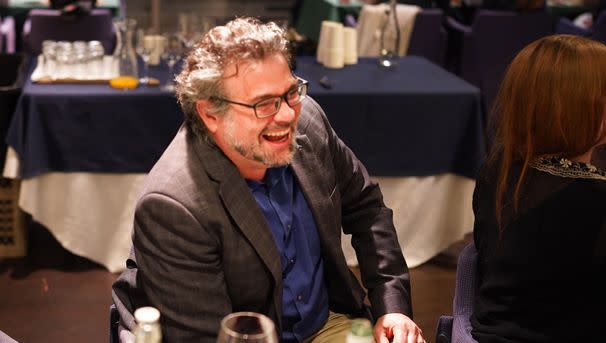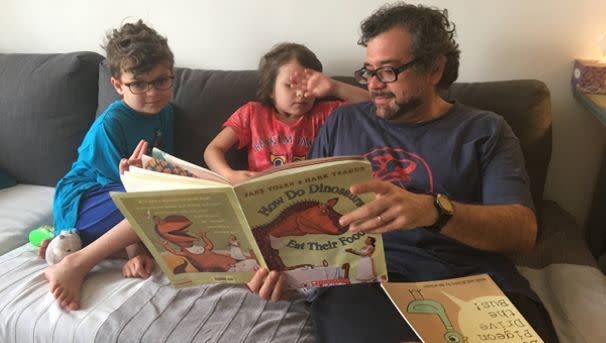Testimonial from Matt Murray, Editor in Chief, The Wall Street Journal
As a reporter and editor, Carlos Tejada was a life force — bursting with energy, ideas, enthusiasm and curiosity. He was a stickler for style, but an enthusiast of the work and efforts of reporters, one of those editors who is always trying more to draw out than to tamp down. He had a wide range of interests and expertise, but always behaved like a student with more to learn, balancing rigor with flexibility. He understood that as an editor he needed to get the facts right, but that he also needed to be a coach, psychologist and sometimes a taskmaster — and he knew how to balance those traits. He also was always a generous and welcoming friend and colleague, welcoming newcomers and nurturing strong relationships in every stage of his career. Carlos wrote and edited many great stories; but his greatest legacy is probably in the thousand ways he left marks in many journalists, from editing lessons to small acts of kindness, and as a model of an open, curious and humane journalist.
Matt Murray, Editor in Chief
The Wall Street Journal
Letter from Rebecca Blumenstein, Deputy Managing Editor, The New York Times
From his days at KU and The Wall Street Journal and then The New York Times, it was clear to anyone who knew him that Carlos Tejada had found his calling in journalism. His laugh bellowed out across newsrooms wherever he worked.
Carlos wasn’t with us nearly long enough. But I’ve never witnessed anything quite like the impact he had on so many people around the world. There are so many reasons for this: his kindness, his enthusiasm, his ability to elevate the stories, the careers – and the character – of those around him.
Carlos was the very definition of a selfless editor. He always made a special point of bringing everyone along, no matter how intense the story. He also made sure to elevate the work of Chinese researchers, helping them land bylines and credit across the newsroom. Carlos never asked for it himself.
He also felt strongly that it was his role as an American journalist in Asia to convey the perspectives of China and the region. He loved the work, even as it often went late into the night, as he did endless rewrites and write throughs to help his colleagues around the world.
He embraced his colleagues as family and Asia as his home. He and Nora opened their own home to countless journalists, whether they were just passing through or nervously settling into a new country. And when the work for the night was done - or even just when there was a blessed break - Carlos would lead the group for karaoke or to join him on an adventure to chase down the latest culinary delicacy. The deeper down an alley, in Beijing, Hong Kong or Seoul this chase led, the happier he was.
I hope that the recipients of this scholarship will continue to build on Carlos’ legacy: to use the mission of journalism to bring accountability and a better understanding to an imperfect world. And to savor every step of the journey, supporting one’s colleagues along the way.
Rebecca Blumenstein, Deputy Managing Editor
The New York Times
Testimonials from The Wall Street Journal and The New York Times
"Carlos Tejada loved to discover. As a journalist he explored facts and storylines, with an unerring devotion to get things right, and he inspired his colleagues to follow his lead. As a person, everyone he met was a potential lifelong confidante. He wanted to learn about your crazy stories and tell you his. Carlos embodied the philosophy in life of always saying yes to an adventure, always wanting to see around the next corner and meet the next stranger, essential qualities of a great journalist and a great friend."
Alex Frangos, Europe Finance Editor
The Wall Street Journal
"Carlos Tejada was as close as they come to the perfect editor. He understood how important journalism was, but not so much that he couldn't see the humor, and at times the absurdity, in the endeavor. His booming laugh was famous in newsrooms across the United States and Asia. Its warmth had an inviting quality to it, as if he wanted everyone around him to join and relish the calling that he loved so much.
In Asia he helped develop the careers of dozens of journalists. Even as he tightened superhuman quantities of copy, he always had time to guide rookies and spitball ideas with his veterans. For so many living far from home, he was like family. For me he became a personification of the institution of journalism itself. Ever cautious and committed, he was unstinting in his passion to hold power to account, and to do so with a credibility that demanded to be heard. It was a principle he also applied to himself. No story or task was too small for him to jump on. His careful guidance created some of the most important journalism out of Asia for more than a decade; work that told truths about internment in Xinjiang, the struggle for democracy in Hong Kong, and intrigues at the top of Chinese politics. Much of it won the awards he always said didn't matter. For Carlos, it was the work that mattered. His loving commitment to it, and to those he did it with, has ensured his legacy will live on."
Paul Mozur, Asia Technology Correspondent
The New York Times
"Every reporter wanted to work with Carlos, and I feel lucky to have done so for five years. I owe so much of my career to Carlos — he was always as excited about my story ideas as I was and had a knack for distilling the most complicated ideas into a single thought. He was a master at being a reporter's editor —- he improved every story that he touched but allowed writers to retain their voices. Most importantly, he always cared, telling me once that an editor's No.1 job is to protect his or her reporters. I still hear his voice when I write."
Sui-Lee Wee, Asia Business Correspondent
The New York Times
"In our 17 years of working together at The Wall Street Journal then at The New York Times, Carlos helped me, as well as many other Chinese journalists, tremendously. He was one of my biggest cheerleaders. When I joined The Wall Street Journal as a news assistant in New York in 2004, I could barely speak English. He was the first editor who really saw me. He told me that with my experiences I was overqualified to staple news skeds. He gave me the courage to ask to do reporting. Reporters who worked with Carlos at both the Times and the Journal knew that we were the lucky ones to have an editor as intelligent, knowledgeable and fairmined as he was. It was a delight to be edited by Carlos. When I wrote about Dr. Zhang Wenhong, a Dr. Fauci-like figure in China, I had a line that said some Chinese women admired him so much that they called him "Nanshen"(男神). Carlos and I went back and forth on the translation between “male god,” “prince charming” and settled on “Mr. Perfect.” I wish I kept some of his editing comments. They made me smile."
Li Yuan, Columnist
The New York Times



